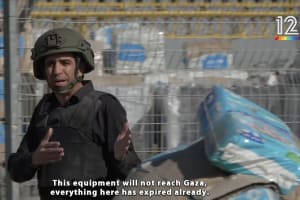World could be destabilized by Israel’s 'disproportionate' response in Gaza, says Spanish PM

Spanish Prime Minister Pedro Sánchez, a vocal critic of Israel, claimed on Wednesday that Israel’s “absolutely disproportionate response” against Hamas terror forces in Gaza had “overturned decades of humanitarian law and threatened to destabilize the Middle East and, as a consequence, the whole world.”
The Spanish premier did not mention the Oct. 7 invasion of thousands of Hamas terrorists into sovereign Israeli territory, and the subsequent massacres of Jews, not seen since the Holocaust. He also failed to mention the ongoing war Hamas has waged on Israel, by firing rockets from civilian areas, including schools, hospitals and mosques, while hiding behind Gazan civilians, a double war crime under international law.
Under the leadership of Sánchez, Spain has emerged as one of Israel’s fiercest critics in the European Union (EU). In November, not long after the Hamas attack on Israel, the Spanish prime minister expressed “serious doubts” concerning the legitimacy of Israel’s military operations against the Iranian proxy in the Gaza Strip.
Jerusalem reacted with anger by recalling its ambassador in Madrid because of the Spanish leader’s “outrageous remarks.”
The Spanish government, which consists of far-left ministers, was among the first of the Western nations to openly call for sanctions and an arms sale embargo on Israel. While the Israeli ambassador, Rodica Radian-Gordon, returned to Madrid in January, relations between the two countries remain tense.
In March, Spain decided to join an EU initiative to recognize a Palestinian Arab state, “in the name of Middle East Peace.” Spain, Ireland, Slovenia and Malta have become the most vocal European champions for unilaterally recognizing the Palestinian Authority (PA) as a de facto state.
“We discussed together our readiness to recognize Palestine and said that we would do so when it can make a positive contribution and the circumstances are right,” the leaders of the four countries said in a joint statement.
“We have to decide when to do it – when we contribute to a solution – and, therefore, it is a matter of political assessment,” the Spanish prime minister said in March.
Sánchez, who recently visited Jordan, Qatar and Saudi Arabia, claimed on Wednesday that recognizing the Palestinian Authority as a state is “in Europe’s geopolitical interests.”
“The international community cannot help the Palestinian state if it does not recognize its existence,” he told reporters. Sánchez has indicated that Madrid could potentially recognize “Palestine” as a state, by the end of June.
Israel and its allies have stressed that the two-state formula should be potentially implemented within the framework of direct negotiations, not through unilateral decisions. Furthermore, Israel’s leaders have warned that recognizing a state of "Palestine" at this moment in time would constitute a huge reward for Hamas’ terrorism, and only embolden extremism throughout the world.
In January, EU Foreign Policy Chief Josep Borrell, another vocal critic of Israel, blasted Israeli Prime Minister Benjamin Netanyahu for opposing the internationally favored two-state solution.
“Which are the other solutions they have in mind? To make all the Palestinians leave? To kill off them?” Borell, the former Spanish foreign minister, asked rhetorically.
“What we want to do is to build a two-state solution. So let’s talk about it.”

The All Israel News Staff is a team of journalists in Israel.
You might also like to read this:

















